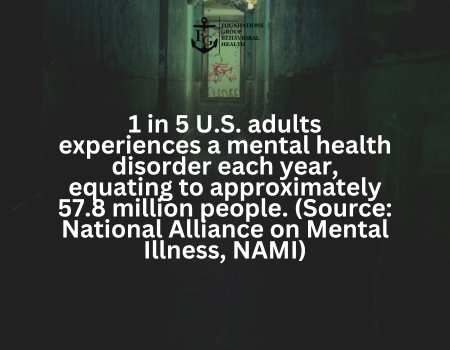Mental health disorders affect millions of people worldwide, yet stigma continues to act as a barrier to seeking help. This stigma, often fueled by misinformation and societal judgments, prevents individuals from accessing critical care, prolonging suffering and worsening outcomes. At Foundations Group Behavioral Health, we are committed to breaking down these barriers through education, compassion, and accessible care. Programs like Psychiatric Day Treatment, Half-Day Treatment Programs, and Outpatient Mental Health Programs provide individuals with the tools they need to address their mental health in a supportive environment.
Understanding the Stigma Surrounding Mental Health
Stigma refers to negative attitudes or discrimination against individuals based on characteristics that society deems undesirable. When it comes to mental health disorders, stigma manifests in several ways:
1. Social Stigma
Social stigma involves prejudiced attitudes or discriminatory behavior toward individuals with mental health conditions. This often leads to isolation, judgment, and exclusion.
2. Self-Stigma
Self-stigma occurs when individuals internalize negative societal beliefs, leading to feelings of shame, low self-esteem, and a reluctance to seek help.
3. Institutional Stigma
Institutional stigma refers to systemic barriers, such as inadequate insurance coverage, limited mental health resources, or discriminatory workplace policies, which make it harder for individuals to access care.
The Impact of Stigma on Mental Health
The consequences of stigma are far-reaching, affecting individuals, families, and communities:
- Delayed Treatment
Fear of judgment often prevents individuals from seeking timely care. Studies show that individuals with mental health disorders wait an average of 10 years before accessing treatment. - Worsened Symptoms
Untreated mental health conditions can escalate, leading to more severe symptoms, co-occurring disorders, or even crises. - Social Isolation
Stigma drives individuals to hide their struggles, leading to loneliness and a lack of support. - Barriers to Employment
Discrimination in the workplace can hinder career growth and financial stability for individuals with mental health challenges.
Why Breaking the Stigma is Critical
Destroying the stigma of mental health disorders is essential to fostering a culture of acceptance, understanding, and support. Here’s why it matters:
- Encouraging Help-Seeking Behavior
Reducing stigma empowers individuals to seek help early, improving outcomes and preventing crises. - Promoting Awareness
Education about mental health helps debunk myths, reducing fear and judgment. - Building Support Networks
When stigma is addressed, communities become more inclusive, offering support to those in need. - Improving Treatment Access
Advocacy for mental health equity ensures that resources like Behavioral Health Treatment Centers in Massachusetts are available to everyone.
How Foundations Group Behavioral Health is Fighting Stigma
At Foundations Group Behavioral Health, we are dedicated to creating a stigma-free environment where individuals can access comprehensive care. Our evidence-based programs are designed to meet the unique needs of each individual:
1. Psychiatric Day Treatment
- Provides intensive, structured care for individuals with moderate to severe mental health challenges.
- Includes therapy, skill-building workshops, and psychoeducation in a supportive setting.
2. Half-Day Treatment Programs
- Ideal for those balancing mental health care with work, school, or family responsibilities.
- Focuses on developing coping strategies and building resilience.
3. Outpatient Mental Health Programs
- Offers flexible treatment for individuals with mild to moderate symptoms.
- Combines individual and group therapy to address anxiety, depression, and other mental health conditions.
4. Co-Occurring Disorder Treatment Programs
- Provides integrated care for individuals with both mental health disorders and substance use challenges.

Steps to Destroy the Stigma of Mental Health
- Educate Yourself and Others
Understanding mental health disorders is the first step in breaking down stigma. Share accurate information and challenge myths whenever you encounter them. - Use Person-First Language
Speak about mental health respectfully. For example, say “a person living with depression” instead of “a depressed person.” - Share Your Story
If you feel comfortable, sharing your mental health journey can help normalize these conversations and inspire others to seek help. - Advocate for Change
Support policies and initiatives that promote mental health equity, such as increased funding for treatment programs and anti-discrimination laws. - Seek Help Without Shame
If you or a loved one is struggling, reaching out for help is a sign of strength. Programs like an Anxiety Treatment Program or a Depressive Disorder Treatment Program can make a significant difference.
Why Choose Foundations Group Behavioral Health?
Located in Massachusetts, Foundations Group Behavioral Health offers compassionate, stigma-free care. Our team of experienced clinicians is dedicated to helping individuals achieve lasting recovery through evidence-based therapies and personalized treatment plans.
Our Core Values Include:
- Inclusivity: Providing a safe and welcoming environment for all.
- Comprehensive Care: Addressing the whole person, not just the symptoms.
- Community Support: Building networks of care to reduce isolation and stigma.
Take the First Step Toward Healing
Breaking the stigma of mental health disorders starts with you. Whether you’re seeking help for yourself or advocating for a loved one, remember that treatment is available, and recovery is possible.
At Foundations Group Behavioral Health, we are here to support you every step of the way. Contact us today to learn more about our programs, including Psychiatric Day Treatment, Half-Day Treatment Programs, and Outpatient Mental Health Programs. Together, we can create a world where mental health is treated with the same compassion and urgency as physical health. Contact us today at 888.685.9730 to learn more about our programs and take the first step toward recovery.
FAQ on Stigma of Mental Health Disorders
How does stigma affect people with mental health disorders?
Stigma can lead to delayed treatment, worsened symptoms, social isolation, and discrimination in the workplace or healthcare settings. It often prevents individuals from seeking the help they need.
Why is it important to break the stigma around mental health?
Breaking stigma encourages individuals to seek help without fear of judgment, promotes awareness, and fosters a culture of compassion and support for those struggling with mental health challenges.
How can I help reduce mental health stigma?
You can help by educating yourself, using respectful language, sharing personal stories, advocating for mental health policies, and supporting individuals seeking treatment.
What programs are available to help with mental health disorders?
Programs like Psychiatric Day Treatment, Half-Day Treatment Programs, and Outpatient Mental Health Programs provide comprehensive care for individuals managing anxiety, depression, and co-occurring disorders.
What is a Behavioral Health Treatment Center?
A Behavioral Health Treatment Center offers specialized programs and therapies for individuals with mental health and substance use disorders. These centers provide evidence-based care in a supportive, stigma-free environment.
How does Foundations Group Behavioral Health address stigma?
We provide a compassionate and inclusive space for individuals seeking treatment. Our programs focus on education, therapy, and building community support to reduce stigma and empower recovery.
When should I seek help for a mental health disorder?
If symptoms of anxiety, depression, or other mental health challenges interfere with your daily life, relationships, or work, it’s time to seek professional help. Early intervention leads to better outcomes.








